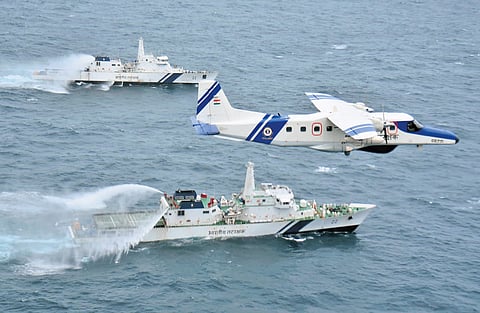

KOCHI: The Indian Coast Guard (ICG) on Monday confirmed oil spill in the Arabian sea, around the area off Kerala’s coast where MSC Elsa 3, a Liberia-flagged container vessel carrying hazardous cargo and calcium carbide, sunk the day before. It has deployed three vessels and an aircraft for counter-pollution operations.
The Coast Guard’s Offshore Patrol Vessels ICGS Saksham, ICGS Vikram and ICGS Samarth utilised infrared cameras to detect the oil spill area and sprayed OSD (Oil Spill Dispersant) to contain the spread. A Dornier aircraft is conducting aerial assessment and OSD dispersal in the 2x1 nautical miles area where the spill has been detected. The vessels are churning the waters using hoses and propeller to mix the dispersant.
Meanwhile, ICG Ship Samudra Prahari, a specialised pollution response vessel carrying significant quantities of OSD, has set sail from Mumbai and is expected to reach Kochi on Tuesday.
The Coast Guard said in a release: “At approximately 0750 hrs on May 25, MSC Elsa 3 sank around 15 nautical miles off the coast of Kerala, southwest of Alappuzha.
The maritime incident has raised environmental concerns, including the potential for oil spill impact and drifting of debris and cargo ashore along Kerala’s coastline.
Within 2-3 hours of the vessel’s submergence, the ICG surveillance aircraft detected the presence of an oil slick at the site at 11 am, the oil slick was observed drifting in east-southeast direction at an estimated speed of 1.5-2 knots (around 3.7 kmph). By 2pm, the spill was assessed to have spread over an area of approximately 2x1 nautical miles”
The ship had 84.44 tonnes of diesel and 367.1 tonnes of furnace oil when it sank, and this caused the oil spill.
Statement of ship’s crew to be recorded today
Confirming that the oil slick has not reached the shores, ICG has advised the state administration to prepare for shoreline cleanup operations.
The Mercantile Marine Department (MMD) , Kochi, has issued a warning to the vessel’s owners regarding pollution liability and launched an investigation into the incident.
MMD principal officer and Joint Director J Senthil Kumar met the 24 crew members of the sunken vessel on Monday. As the crew were yet to recover from the trauma, the MMD decided to record their statements on Tuesday.
It has directed the shipping agency to present the cargo manifest, a document that lists the contents and details of the shipment. As per information provided by the agency, there were 643 containers in the vessel of which 13 contained hazardous cargo and 12 had calcium carbide in it.
“Oil is normally shipped in tankers and the diesel and furnace oil in the vessel was not part of the cargo. It was the fuel stored to power the engine and for internal power generation,” said an MMD official.
The MMD will investigate whether it were flaws in loading the containers or bad weather that caused listing of the vessel. It has directed the shipping agency to deploy technical staff to salvage the floating containers and to explore the possibility of retrieving the oil from the ship’s tank. However, the presence of large quantity of calcium carbide and hazardous cargo is posing a challenge.
“The ship is 28 years old, but we don’t think that could be the reason for capsize. Merchant vessels have to go for drydocking every five years. We will summon the safety department of MSC from Cyprus to check these aspects,” said the MMD officer.
“The oil spill can pollute the marine ecosystem. The polycyclic aromatic hydrocarbons released into the water column can damage the marine ecosystem. The trace metals like arsenic, chromium and mercury may reach the sea bed and enter the food chain through zooplanktons,” said fisheries scientist B Madhusoodana Kurup.
“The huge quantity of calcium carbide in the sunken containers can trigger exothermic reaction when it comes into contact with water. This can release huge amount of heat that can pose threat to marine organisms,” he said.